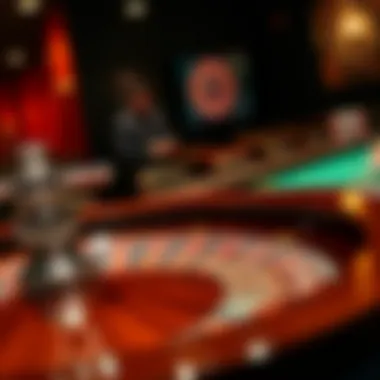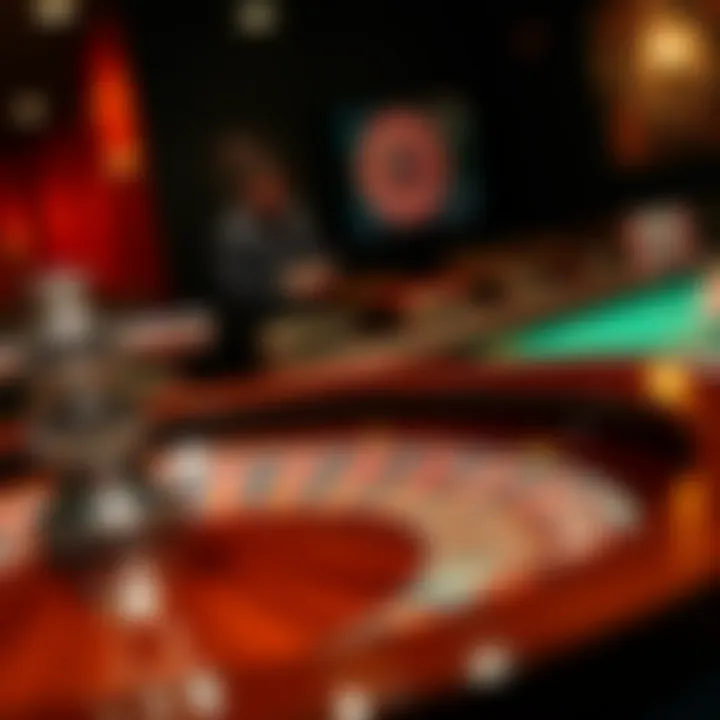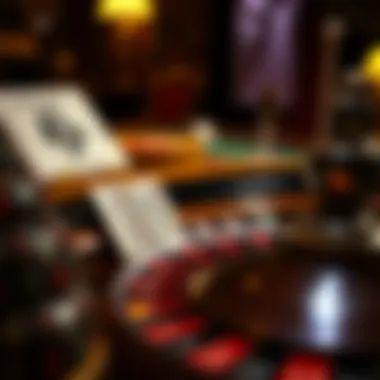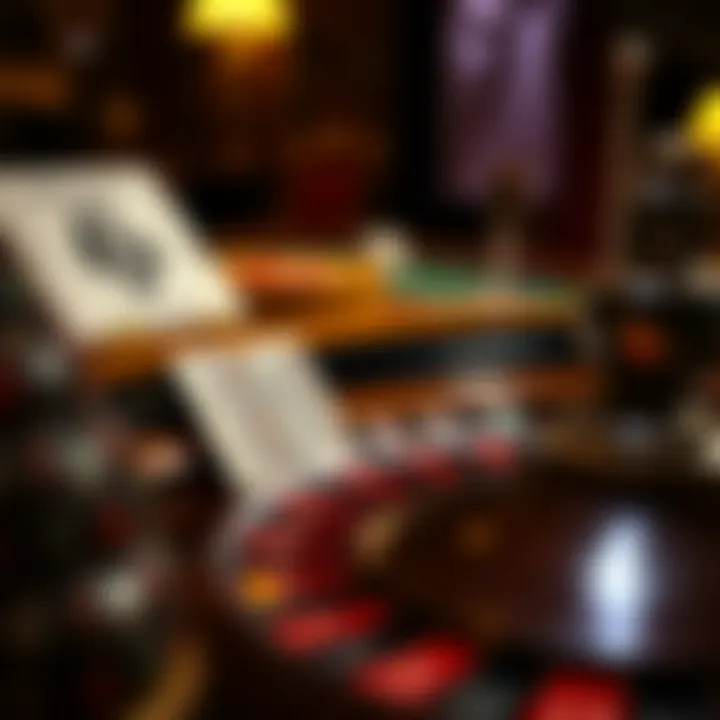Exploring the Intricacies of Roulette Gambling


Intro
Roulette is more than just a game of chance; it is a captivating blend of history, strategy, and cultural significance that traverses borders and generations. For many, the spinning wheel and bouncing ball serve as an emblem of excitement, while for others, it represents an intricate puzzle to decode. From the high-stakes tables of Monte Carlo to local casinos, the game has undergone an evolution, intertwining the threads of technology and psychology with every spin.
In this exploration, we delve into the mechanics of roulette gambling, examining different betting strategies and the psychology behind gambling behaviors. We'll dissect the cultural implications tied to this popular leisure activity and study how modern technology continues to shape the experience of players worldwide. Through this journey, you will gain valuable insights that can enhance your understanding and approach to roulette, whether you are a seasoned player or a curious observer.
With a nod to the historical context and a look at contemporary practices, this article promises a comprehensive guide that connects the dots between the past and present of this fascinating game. Let’s get rolling!
Intro to Roulette
Roulette stands as one of the quintessential symbols of gambling, a game that encapsulates both thrill and strategy. To understand roulette is to appreciate a complex web of history, mathematics, and psychology that intertwines with chance and choice. This section serves as an entry point into the intricate world of this timeless game, where every spin of the wheel invites both seasoned gamblers and novices alike to take a plunge into uncertainty.
Exploring the historical origins of roulette gives insight into how this game evolved through centuries and embraced various cultures. Tracing its roots can provide gamblers with a sense of the game's evolution and the factors that contributed to its global appeal.
Moreover, comprehending how roulette captured global attention is vital in appreciating its cultural significance. The way it has been portrayed in films, books, and pop culture has shaped public perception and influenced gambling behavior. Beyond just a game of chance, roulette embodies notions of luck and strategy, resonating deeply with individuals around the world.
A comprehensive understanding of these elements will arm readers not only with knowledge about the mechanics of the game but also with insights into the feelings and cultures surrounding gambling itself. Thus, this section lays the groundwork for a detailed exploration of every aspect of roulette, opening the door for further investigation into betting strategies, technology's impact, and responsible gambling practices.
Understanding the Mechanics of the Game
Understanding the mechanics of roulette is crucial for anyone looking to navigate the complexities of this game of chance. The interplay of the roulette wheel, betting layout, and game rules creates a framework that not only defines the experience of roulette but also influences betting strategies and outcomes. By paying attention to these elements, players can harness a deeper comprehension of how the game operates, making them more equipped to make educated decisions at the table.
Roulette Wheel and Betting Layout
The roulette wheel is the heart of the game. It comprises numbers ranging from 0 to 36, with American roulette adding a double zero. Each number is a distinct pocket on the wheel, and the arrangement is such that colors alternate in a seemingly random pattern. This layout can affect the outcomes based on players' betting patterns and game strategies.
Betting layouts are equally important. Players place their chips on a table that reflects the numbers of the wheel, divided into distinct sections. The layout’s structure not only highlights which numbers can be bet upon but also organizes those numbers into various betting types, such as inside, outside, and call bets. The visual display of available bets invites players to devise strategies that can inform their betting choices.
Rules Governing Roulette Games
Every player needs to grasp the fundamental rules that underpin roulette. These rules dictate how bets can be placed, how the game progresses, and what happens when a ball lands on a number. Understanding the rules prevents errors in gameplay and fosters a smoother gaming experience.
A few key rules include:
- Bet Placement: Bets must be placed before the croupier spins the wheel.
- Payout Ratios: Each type of bet has specific odds and payouts, differing between European and American roulette.
- House Edge: Players should also be aware of the house edge, which varies depending on the roulette variant, influencing long-term outcomes.
Overall, these rules provide a structure that enables both casual players and strategists to engage with the game effectively.
Types of Bets in Roulette
Different types of bets exist in roulette, allowing players to tailor their wagering style to match their risk tolerance and strategy. Understanding these betting categories enriches gameplay and aids in developing a systematic approach.
Inside Bets
Inside bets refer to wagers placed on individual numbers or groups of numbers within the interior of the betting layout. A hallmark of these bets is their potential for higher payouts when successful.
Key characteristics of inside bets include:
- High Risk, High Reward: The payouts for inside bets range significantly; for instance, betting on a single number can yield payouts as high as 35 to 1.
- Variety of Combinations: Players can choose from various combinations, including straight bets, split bets, and more, each providing a different payout potential.
However, inside bets come with their drawbacks. The odds of winning are lower than outside bets due to the fewer winning possibilities, making them suitable for those who prefer intense excitement and high stakes.
Outside Bets
In contrast to inside bets, outside bets are made on options located outside the numbered grid on the layout. They are characteristic for their wider range and comparatively lower risk, appealing to both newcomers and seasoned gamblers alike.
Notable features of outside bets include:
- Lower Payouts but Higher Odds: While the payout might only be 1 to 1 for bets like red or black, players benefit from better odds of winning, which contributes to consistency in gameplay.
- Variety: Outside bets encompass options such as even/odd and high/low, diversifying the betting strategies available.
Despite the decreased payout range, many players opt for outside bets because they offer more favorable winning odds, providing players with a steady approach to playing roulette.
Call Bets
Call bets are those placed at specific gaming tables, allowing players to bet on groups of numbers without physically placing their chips on the betting layout. They generally originate from European roulette, adding a different flavor to betting choices.


The characteristic features of call bets include:
- Flexibility: Players can strategically bet on multiple numbers with just one call—focusing on area bets such as 'Voisins du Zero' or 'Tiers du Cylindre.'
- Accessibility: These bets simplify complex strategies by providing a clear pre-set option for betting.
Nonetheless, call bets may necessitate a deeper understanding of the roulette table as they can appear more complicated than traditional betting options.
In summary, understanding the different types of bets, including the mechanics of the roulette wheel and the applicable rules, positions players for a grittier engagement with the game. Knowledge equips gamblers to approach roulette with both strategy and savvy.
Exploring Types of Roulette
Understanding the variations of roulette is crucial for any player aiming to master this intricate game. Each type of roulette presents not only slightly diverse rules but also different house edges, gameplay experiences, and betting opportunities. It’s about more than just spinning the wheel; knowing these nuances can dramatically influence your strategy and potential returns.
Different styles cater to distinct tastes and preferences. Some players might gravitate towards the simplicity and elegance of European Roulette, while others might enjoy the added complexity and thrill of American Roulette. Each version has its unique set of features that can enhance the gambling experience. Recognizing the subtle yet significant differences among these variants helps gamblers tailor their strategies accordingly, increasing their chances for success.
European Roulette
European Roulette is often heralded for its simplicity and favorable odds. Characterized by its single zero pocket, this variant reduces the house edge to around 2.7%. This might not seem like much at first glance, but it can be the difference between winning and losing in the long run.
The betting layout allows for a wide array of betting options, appealing to both conservative players and those willing to take risks.
- Low House Edge: The single zero reduces the overall house advantage, giving players a better chance over time.
- Straightforward Betting Options: The layout presents a combination of inside and outside bets that cater to various strategies, from simple bets on colors to complex combinations.
In European Roulette, players are often met with fast-paced action, which can boost the thrill. Its popularity across Europe and in online platforms reflects its lasting appeal among gamblers worldwide.
American Roulette
American Roulette introduces a second zero pocket, which significantly alters the house edge, pushing it to a staggering 5.26%. This feature gives the house a higher statistical advantage, affecting your betting strategy dramatically.
With its unique wheel design and the double zero, this variation is especially popular in casinos across the United States. Here, players encounter a different set of dynamics.
- Increased Risk: The additional pocket alters betting patterns, making it crucial for players to adapt their strategies to offset the higher house edge.
- Varied Betting Options: American Roulette offers the same bets as European Roulette, but players must be more cautious with their stakes due to the differing odds.
While some players appreciate the complexity involved in American Roulette, others often shy away, understanding that the stakes can be considerably higher over time.
French Roulette
Taking the best aspects of both the European and American variants, French Roulette is unique because it incorporates the "La Partage" and "En Prison" rules, which are designed to further reduce the house advantage. Players can reclaim half of their even-money bets if the ball lands on zero—something that can keep players in the game longer.
- House Edge: With effective use of the La Partage rule, French Roulette can bring the house edge down to as low as 1.35% for even-money bets.
- Sophisticated Style: The game is often played on a beautifully detailed table, enriching the player's overall experience and connection to the game.
French Roulette appeals to those looking for an interactive experience, as players often engage with the croupier while placing their bets. The combination of elegance and strategy makes it a favorite among many veteran gamblers.
Live Dealer Roulette
With the advent of technology, Live Dealer Roulette has emerged as a modern favorite among online gamblers. It bridges the gap between traditional casino play and the convenience of online platforms, offering players a more authentic experience that includes real-time interaction with dealers.
This format allows players to engage in betting from the comfort of their homes yet immerse in a social atmosphere.
- Real-Time Interaction: Players can chat with dealers and other participants through live streaming, creating a sense of community that replicates an authentic casino experience.
- Technology Integration: Advanced analytics and simulation tools can track player behavior and game outcomes, providing insights that might affect betting strategies.
Although not physically present at a casino, Live Dealer Roulette transports players to the roulette table, making it a favored choice for gamblers who appreciate human interaction in an otherwise virtual gambling environment.
By exploring these various types of roulette, players can make informed decisions that enhance their gambling experience, tailored to their strengths and strategies, ultimately stepping closer to success.
Strategic Approaches to Roulette
Understanding the strategic approaches to roulette is essential for anyone looking to navigate the unpredictable waters of this game. While roulette carries an air of chance, employing a calculated strategy can help players manage their bankrolls more effectively and possibly enhance their overall experience. An awareness of betting systems and risk management techniques is critical, particularly for those eager to make informed decisions at the table. Whether you are a novice or a seasoned player, aligning your betting style with established systems may lead you closer to your goals.
The Martingale System
The Martingale system is one of the most well-known betting strategies out there, particularly favored by those who play roulette. The principle is relatively straightforward—you double your bet after each loss, returning to your initial bet after a win. It sound a bit like a surefire way to win big, but it carries notable risks. In theory, a player will eventually win back all previous losses plus a profit equal to their initial bet. But in reality, a long losing streak can wipe out a bankroll before a win occurs.
Consider you start with a $10 bet. If you lose, your next bet would be $20. If you lose again, the next bet jumps to $40, and so on. The system can quickly escalate the bets. A player's tolerance for loss and their bankroll size must be considered; many casinos have maximum bet limits that can complicate the execution of this strategy.
The Fibonacci Strategy


The Fibonacci strategy utilizes a different approach based on the famous mathematical sequence. In this system, you bet using numbers that follow the Fibonacci sequence (1, 1, 2, 3, 5, 8). Each number represents the amount you bet, and the next bet is derived from the sum of the previous two bets. The intention is to recover losses more gradually than the Martingale method.
For instance, suppose you start with a $1 bet. If it loses, you bet $1 again; if you lose again, your next bet is $2. This continues in the sequence until a win occurs. While it offers a slower approach to recovering loses, the strategy can still pose risks during extended losses. Understanding the pacing of your bets is key, as excessive losses can lead to a rapid escalation in bets.
’Alembert and Labouchere Systems
Both D'Alembert and Labouchere systems offer alternative frameworks for players seeking structured betting methods.
- D’Alembert is somewhat similar to Fibonacci but typically viewed as less aggressive. Here, players increase their bet by one unit after a loss and decrease by one unit after a win. The method aims to balance out wins and losses progressively, making it a more conservative approach over time.
- Labouchere, on the other hand, takes a different slant. The player establishes a sequence of numbers representing their desired profit. The bet is the sum of the first and last numbers in the sequence. If you win, those numbers are crossed off. If you lose, the laid out numbers grow. This strategy plays out as a list of potential gains, creating an element of a goal-setting mentality during play.
Risk Management Techniques
Employing effective risk management techniques can make the difference between a pleasant outing and a costly experience at the roulette table. Players must assess their preferences regarding time and budgeting. Here are a few fundamental practices:
- Set a Budget: Define a clear limit before engaging in the game. This should encompass both wins and losses, preventing players from chasing losses excessively.
- Time Constraints: Establish a timeframe for your session, as playing without a time limit may lead to poor financial decisions.
- Take Breaks: Periodic pauses can help maintain composure. Emotions can dictate decisions, and stepping away from the table can restore clarity.
"Having a plan is half the battle. No plan means no direction."
In summary, strategic approaches to roulette can provide players with essential tools for a more organized gambling experience. Each system has its strengths and trade-offs, and players must gauge their risk appetite before diving in. With a little calculation and an ability to adapt, understanding these strategies may pave the way for a more enjoyable time at the roulette table.
Psychology of Betting Behavior
Understanding the psychology behind betting is far from a frivolous endeavor; it is, in fact, a cornerstone to decoding the intricate dance of dynamics that roulette gambling presents. From a nuanced view, betting behavior isn't purely about odds and outcomes. Instead, it’s a labyrinth of human emotions, cognitive patterns, and social influences which come into play. Exploring this aspect equips gamblers with tools that help them make informed decisions. Having a grasp on these psychological elements can lead not only to enhanced strategies but also to better enjoyment and less stress during play.
Cognitive Biases in Gambling
Cognitive biases are sneaky little gremlins that can warp our perception without us even noticing. In the realm of gambling, they can significantly skew our judgments and impact our decisions. Take the Gambler's Fallacy for instance; it's the belief that if something has happened more frequently than normal in the past, it’s less likely to happen in the future. When a roulette wheel seems to favor certain numbers, bettors might feel inclined to avoid those or start placing bets on them, thinking they are ‘due’ to hit. The truth? Every spin is an independent event, and previous outcomes don’t dictate future spins.
Another notable example is the confirmation bias, where players only remember their wins and ignore their losses. This selective memory can create a false sense of confidence, prompting them to increase their stakes—often to disastrous effect.
To navigate these biases, it helps to be aware of them. Keeping a betting journal might also aid in recognizing patterns in one's own behavior. Documenting wins and losses can offer a clearer perspective, stripping away the emotional fog that biases tend to create.
The Impact of Emotions on Decisions
Emotions play a significant role in how individuals engage with roulette gambling. When the stakes are high, so too are the emotions. Excitement, fear, joy, and frustration can each influence decision-making at the wheel. A win can ignite a rush of euphoria, leading bettors to take risks they wouldn't ordinarily consider. On the flip side, a series of losses may usher in feelings of despair or desperation, pushing someone to chase their losses—an often perilous path.
Consider this: when players are calm and collected, they tend to make more rational choices, while high emotions can skew their ability to think clearly. Recognizing one's emotional state before and during gaming can be imperative in making sound bets. Implementing breaks or predetermined limits could buffer against making decisions based on emotional highs or lows.
"Understanding the psychology of betting behavior can not only enhance your gaming experience but also protect your finances."
By harnessing knowledge about cognitive biases and emotion-driven decisions, gamblers can transform their approach to roulette, combining skill with an awareness of the complexities of the human psyche. This understanding grants them a more profound advantage, whether looking to enhance enjoyment or secure more strategic outcomes.
The Role of Technology in Roulette
As the landscape of gaming continues to shift at an astonishing pace, the role of technology in roulette gambling has become more pronounced and multifaceted. Technology is not just a backdrop; it is a driving force that alters how players engage with this classic game. From online platforms to sophisticated analytical tools, the integration of technology enhances the overall experience and influences decision-making processes.
Online Roulette Evolution
The move from traditional physical casinos to online roulette has been truly revolutionary. Initially, playing roulette required a trip to a bustling casino filled with the sounds of spinning wheels and clinking chips. Players often had to navigate through crowds and long lines just for the chance to place a bet. Now, the entire experience can be accessed from the comfort of one’s home or on mobile devices. With just a quick swipe or click, players can join games that are live-streamed or utilize random number generators (RNG) for online play.
- Convenience: As you might guess, the biggest perk of online roulette is convenience. No more dressing up or traveling. Players can roll the virtual ball whenever they choose.
- Variety of Games: Online platforms boast an array of roulette games, from European to American variations, often featuring unique twists and side bets you rarely find in physical settings.
- Bonuses and Promotions: Online casinos typically lure in new players with bonuses and promotions, making it often more appealing than traditional casinos, which can save money in the long run.
"The shift to digital platforms has democratized access to roulette, allowing players from diverse backgrounds to engage with this age-old game in fresh and innovative ways."
Using Simulation and Analytics
Analyzing gambling behavior has never been easier thanks to technological advancements. Players and casinos alike can benefit from simulations and analytics that provide insights into game strategies and player tendencies.
- Simulations: These tools allow players to practice their strategies without financial risk. Beginners can familiarize themselves with different betting systems, honing their skills before diving into real money games.
- Player Analytics: Casinos use powerful analytics to understand player behavior better. They track betting patterns, preferences, and outcomes to tailor experiences for both casual gamblers and seasoned veterans. This data can influence everything from promotional offers to game design.
- Risk Assessment: For serious players, analytics can help quantify risk and develop strategies based on real statistical models. This empowers players to make informed decisions rather than relying solely on luck.
In summary, technology plays a vital role in reshaping how roulette is experienced and understood today. From the comfort of home with online roulette to cutting-edge simulation and analytics, the future of this compelling game promises to be as dynamic as its history.
Cultural Significance of Roulette
Roulette is not just a game of chance; it's woven into the fabric of gambling culture and has influenced art, film, and social gatherings. From Monte Carlo glamour to suburban casinos, roulette tables have become iconic symbols of risk and reward. This cultural significance underscores the game’s role beyond mere entertainment, elevating it to a status that captures the very essence of human behavior—our hopes, dreams, and the lure of fortune.


The game represents a crossroads of fate and free will, appealing to diverse audiences ranging from high rollers to casual players. For many, it embodies a moment of suspense and excitement, where every spin holds potential. Understanding roulette's place in society reveals much about our collective psyche regarding luck, betting, and the search for thrill. It showcases how cultural perceptions can impact gambling behavior and decision-making.
Roulette in Popular Culture
Roulette finds its place prominently in popular culture, often synonymous with glamour and high stakes. Movies like Casino Royale feature roulette as a critical point for building tension and showcasing character dynamics. The imagery associated with these films often leads to an idealized representation of roulette—flashy lights, swanky settings, and the whisper of chips rolling on the table. It’s more than a game here; it’s a vehicle for storytelling and character exploration.
Beyond cinema, roulette has been referenced in literature—from Dostoevsky’s The Gambler portraying the agony and ecstasy of gambling to contemporary novels that use the game to explore themes of chance and fate. Additionally, in music, songs often weave roulette metaphors to depict life choices or romantic risks. This plethora of cultural references enriches the game’s significance, emphasizing its dual role as both a source of inspiration and a reflection of societal attitudes toward risk-taking.
Perceptions of Fortune and Luck
Roulette serves as a focal point for our beliefs in luck and fortune. Many players approach the roulette table with specific rituals—lucky coins or a favorite number, all stemming from the need to assert control over an unpredictable game. The color red and black takes on a mystical quality, where choices are often infused with personal significance or cultural beliefs about luck.
The relationship with luck extends beyond the game itself. Different cultures interpret chance and fortune in unique ways. In the Western context, roulette may symbolize risk acceptance, while in Eastern traditions, numbers carry specific meanings, influencing betting patterns. The perception of luck in roulette reflects broader beliefs about destiny and control. As players engage with the wheel, they embody a universal struggle: the balance between calculated decisions and the acceptance of chance.
"Roulette opens the door to a world of possibilities, enticing players with the idea that fate can change in an instant."
As we analyze roulette's cultural significance, it becomes evident that the game transcends its mechanics. It represents our intrinsic human drive to gamble with fate, a quest not merely for money, but for the thrill of the unexpected and the stories we create along the way.
Responsible Gambling Practices
Responsible gambling is a vital part of maintaining a healthy relationship with betting games, including roulette. The allure of the spinning wheel can, at times, overshadow the underlying risks associated with gambling. Thus, understanding and implementing responsible gambling practices is not merely advisable; it’s essential.
Setting Limits for Play
Establishing a clear set of limits before one even sits down to the roulette table is crucial. This connects back to the notion of self-regulation, which can buffer against the impulsive decisions that arise during gameplay. Setting a budget helps players not only enjoy the game but also keep finances in check. Engaging with roulette should feel like a leisure activity, not an endeavor fraught with stress.
To effectively set limits, consider these suggestions:
- Define a clear budget: Before starting, decide how much money you’re willing to spend. Stick to it.
- Time management: Set a timer for your gaming session. Take breaks to prevent fatigue and poor decision-making.
- Pre-decide win/loss limits: Establish a win goal to cash out at a certain profit and a loss limit where you walk away to reassess your strategy.
Establishing such parameters serves as a safeguard, preventing the slippery slope of "just one more spin," which can lead to regret. A well-defined approach keeps the fun intact while ensuring financial health remains a priority.
Recognizing Problem Gambling Signs
Awareness is your steadfast ally when it comes to responsible gambling. Recognizing the signs of problem gambling can make a world of difference not just for players but their families and communities too.
Here are key indicators to look out for that may suggest a shift from casual gaming to more serious issues:
- Increased Time at the Table: If you find yourself spending more time than originally planned or seeking excuses to stay longer, it may be time to reevaluate your habits.
- Emotional Changes: Heightened feelings of anxiety or stress related to gambling can serve as red flags. Gambling should not feel like a source of distress.
- Chasing Losses: Persistently attempting to recover losses by continuing to play indicates a danger zone. It's a common pitfall that makes fortunes bleed away.
- Neglecting Responsibilities: If gambling starts to interfere with work, relationships, or other essential areas of life, it points to a concerning trend that needs attention.
- Increasing Financial Strain: Continuously borrowing money or struggling to meet financial obligations due to gambling activities should not be ignored.
"The most powerful tool against gambling addiction is not the wheel of fortune but the wisdom to walk away when the stakes are high."
By recognizing these signs early, individuals can take proactive steps toward seeking help if needed. Support networks, counseling, or even talking openly with friends can be a beneficial approach.
Future Trends in Roulette Gambling
As we look forward in the world of roulette gambling, it’s imperative to consider how evolving technologies and changing regulations will shape the experience for players and operators. The future of this game is not just about the next spin of the wheel; it’s intertwined with innovation and adaptation in the gambling landscape. In this section, we will explore emerging technologies, innovations, and potential regulatory shifts that are on the horizon, and why they matter to anyone who enjoys the game.
Emerging Technologies and Innovations
Technological advancements have always been at the heart of roulette’s evolution. We’ve progressed from traditional wooden wheels in smoky casinos to high-tech gaming environments that utilize artificial intelligence and virtual reality.
With virtual reality (VR), players are not just watching the game unfold; they’re part of it. Imagine sitting at a table surrounded by players from across the globe without leaving your living room. This immersive experience offers an unparalleled level of engagement.
Moreover, artificial intelligence is beginning to play a role in analyzing betting patterns and optimizing game design. Consider this: a system that learns from player behaviors can offer personalized gaming experiences and even adjust odds or gameplay in real-time. However, this sparks a discussion about the ethical implications of such technology. Are players fully aware of how their data is being used?
Additionally, mobile gaming continues to grow. More players are opting to spin the wheel on their smartphones. This means that operators must ensure their platforms are more accessible and user-friendly. Features like live chat support, quick cash-outs, and intuitive interfaces are becoming essential.
"As technology progresses, the line between online and offline gaming blurs, creating a cohesive experience for all players."
The rise of blockchain technology is also noteworthy. This decentralized approach enhances the transparency of transactions, securing players' funds and ensuring fair play. Smart contracts could redefine how games are managed, providing a more trustworthy environment where players feel safe and informed.
Potential Changes in Global Regulations
Regulations surrounding gambling, including roulette, are always in flux. As countries reassess their stance on gambling—especially online—changes in legislation can impact how games are played and offered. For instance, some jurisdictions are beginning to embrace online gambling more openly, while others are tightening restrictions. The duality of these approaches creates a complex landscape.
As technology advances, regulators are faced with challenges in keeping pace. The Internet doesn’t follow borders, and this globalization of gambling requires a collaborative effort among nations. Some countries may adopt similar regulations, while others may impose radically different rules.
It’s crucial for players and operators to stay informed about these shifts. Changes in taxation laws, advertising restrictions, or game operation policies can significantly influence the gambling market. For example, an increase in taxes on online operators might lead to higher costs for players, whereas more relaxed regulations could create a surge in innovative gaming options, enhancing competition.
In light of all this, awareness of local regulations is vital. Players should take the time to read and understand the regulations in their region, ensuring they’re betting within the legal framework. Keeping abreast of changes can provide a strategic advantage while navigating this exciting yet unpredictable realm of roulette gambling.
The future of roulette gambling, marked by technological advancement and regulatory evolution, promises a fascinating journey. As players, it’s key to harness these trends, enabling an informed and enjoyable gaming experience.



